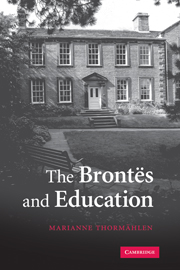Book contents
- Frontmatter
- Contents
- Acknowledgements
- Abbreviations and editions
- Introduction
- I EDUCATION AND SOCIETY
- II HOME AND SCHOOL
- III SUBJECTS AND SKILLS
- 7 A sound English education
- 8 Religion and education
- 9 The accomplishments
- 10 Male and female education
- 11 Beyond the schoolroom: reading and the Brontës
- IV STRATEGIES AND METHODS
- V ORIGINALITY AND FREEDOM
- Notes
- Select bibliography
- Index
10 - Male and female education
Published online by Cambridge University Press: 22 September 2009
- Frontmatter
- Contents
- Acknowledgements
- Abbreviations and editions
- Introduction
- I EDUCATION AND SOCIETY
- II HOME AND SCHOOL
- III SUBJECTS AND SKILLS
- 7 A sound English education
- 8 Religion and education
- 9 The accomplishments
- 10 Male and female education
- 11 Beyond the schoolroom: reading and the Brontës
- IV STRATEGIES AND METHODS
- V ORIGINALITY AND FREEDOM
- Notes
- Select bibliography
- Index
Summary
Sustained academic endeavour was always a prerequisite for the acquisition of the knowledge and skills which took up most of the middle- and upper-class male curriculum: advanced mathematics and, above all, the Classical languages. The extent to which the Brontë sisters were acquainted with Latin and Greek is discussed below. By way of introduction, some space is given to general remarks about those staples of boys' education, and about the nineteenth-century debate on the extension of Classical learning to girls and women.
THE CLASSICS
If the nineteenth-century female curriculum reviewed above contains apparent contradictions, so does the schooling of boys and young men. As the fundamental difference, openly acknowledged, between male and female education was that boys were destined for the labour market and girls for the home, the prevalence of the Classics in the male curriculum seems an oddity. It is difficult to think of a single profession where, say, natural science, geography, foreign languages and modern philosophy would not have offered far more useful preparation than Latin and Greek – except that of the Church, and here we encounter another anomaly in that most of the texts and authors studied belonged outside the realm of Christianity. It seems obvious to a present-day observer that even future lawyers would have derived greater benefit from studying Kant and Voltaire in their original languages than poring over Homer and Horace; the mastery of legal (to say nothing of medical) Latin never called for the parsing of Cicero or the commission to memory of hundreds of lines from the Aeneid.
- Type
- Chapter
- Information
- The Brontës and Education , pp. 121 - 135Publisher: Cambridge University PressPrint publication year: 2007



